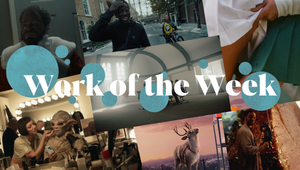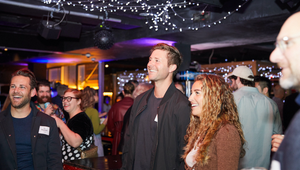
5 Minutes with ... Colin Renshaw

Colin Renshaw took the long way round to a storied visual effects career. The Brisbane-Sydney based founder of ALT VFX and Steelbridge Studio has become a leader in the Asia-Pacific post-production industry.
As we enter the age of virtual production, Colin is ambitious about Australia’s position in the world of production. From advertising to music, Colin’s journey is equal parts unexpected and unlikely.
Here, he sits down with LBB’s Tom Loudon to reflect on his career, creativity, and Australian post-production.
LBB> Colin, thanks for taking the time to speak with us. Let’s start at the very beginning - Looking back, what role did creativity play in your childhood?
Colin> I've always been a creative person. I was always interested in performing. I was a musician. I played in bands in my early 20s. I had a friend who was a musician who was involved in early forms of what is now digital editing, he was using a digital workstation to record music. And I thought that sounded interesting, because I was interested in technology as well. So I guess the two of those things came together.
I was very interested in technology and creativity, which drew me into editing. I'm very interested in AI and how that can enhance creativity and so I'm an early adopter of all of the various forms, especially the image-based stuff I use on a daily basis.
LBB> You mentioned getting into that digital editing side. What was it that first drew you to VFX and post-production?
Colin> While I was in Melbourne working as a musician, I realised that music probably wasn't going to sustain me forever. So I actually went back to school and studied film and television, that's where I learned to use post-production software. After finishing that I joined a small post-production company up here in Brisbane. At this stage I was the tea and coffee boy, but threw myself into it and I went through all the very early incarnations of After Effects and Photoshop. I then became interested in compositing which led me to working around the world as a flame artist and then ending up in logic where I defined my skills. Eventually, I decided to start my own company.
LBB> Once you had that background and experience with VFX, did that naturally draw you to the advertising industry or was that always a part of your plan?
Colin> Well, ironically, when I was at school I wanted to work in advertising, I wanted to be a copywriter or an art director. I was really drawn to advertising in general. When I got into visual effects, it was always originally always commercial projects.
There's so much varied work, and the type of work that we love to do is animation heavy and creature heavy, and we cherry pick the kind of projects that we really like.
Weirdly enough, we now treat a lot of the long form work the same way we would approach commercial work, so we prefer to just pick sequences that play to our strengths and that are interesting, and that we can complete in a shorter time period. Because at the end of the day, most of us are more sprinters than marathon runners. Sometimes, if you're working on long form projects, you have to be a marathon runner.
LBB> Of all the campaigns you’ve worked on throughout your career, which are the really special ones that you are proudest of, and why?
Colin> It was called Toyota kittens. We were replacing all the human heads with kittens. That was interesting in the sense that it was the first time using digital film, and that actually enabled us to be able to make the film because when we had to shoot we used the equivalent of like 30,000 feet of film, but it was all digital.
That was where I really became interested in digital effects. And then weirdly enough, the one that put us on the map after we started off was one on film, Tooheys Extra Dry with a deer going out the city. We hadn't even done our office yet. Those two were quite exciting.
Visual effects were at the end of the project and usually the last thing to be done. Now we're doing projects at the beginning. So we're creating environments, scenes, and becoming more of the actual production rather than the last man standing.
LBB> In the Australian VFX landscape, what would you say are the more interesting things about your company and why does it stand out?
Colin> Alt VFX was the original company, and was pretty much a traditional visual effects company. That's sort of transmogrified now into what we call Alt plus, which is a group of companies all working in and around the visual effects space. I think that's probably what sets us apart from most other effects companies, the fact that we're taking the core artistry, expertise, and technology, and we’re doing virtual production.
At the end of the day, Unreal Engine is just another renderer. We've always tried to be technology agnostic and the way we work we use whatever the best tool is for the job. In the case of virtual production, we're still using all the same core skill sets, have models and textures and animators. So I guess our ability to adapt and then explore all the possibilities sets us apart.
LBB> What exactly are your thoughts on the role of technology and data in creativity, especially considering the technical nature of production and post production?
Colin> There’s the artists that use the tools, and there are technicians that make the tools. One of the things we've always been very big on is running those things in parallel, with equal strength. So from the very beginning, we spent a lot of time and effort employing very smart people to create our pipeline, to make it easier for artists to work, or to be more creative, and able to iterate faster.
Through iteration comes quality, so we've always really tried to invest as much in the non-sexy, backroom mechanics of the business so that the artists have as much freedom as they can. In fact, we've just gone through another change to our pipeline which has made us even more flexible.
We’ve got to invest as much in the technology side as the artistry because one feeds the other.
LBB> Finally, what do you hope to see in the Australian production industry in the coming five to 10 years?
Colin> I would like to see more Australian-owned digital effects and production companies getting up and flourishing. There is a massive influx of foreign companies in the market. I hope that when that changes, they don't all just exit and leave a lot of us sitting around with nowhere to go. I'm hoping that a handful of companies can keep going through this period and keep competing for talent, because talent is probably the scarcest resource.
I really want our local industry to flourish and still be here in five years time. We know that the nature of production is cyclical and follows the money. It's in Canada for one year, then it's in Atlanta – now since COVID it’s been focussed here. But that's not gonna last forever, so building a really solid, robust local industry that can sustain and train future generations that are interested in visual effects is crucial.










